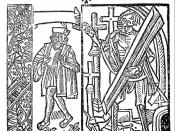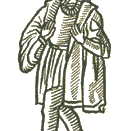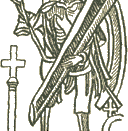Grim Humor in "Everyman"àWe have all known from a very early age that the grim reaper known as "death"àwill someday come to us and take us to our reward. We know that we are responsible for our actions on earth and will have to answer for these actions, good or bad. The play, "Everyman"àpresents this dilemma in a simplistic, yet powerful, saga of what we all face. The humor is understated. However, the humor, although grim, is used to make the reader/listener do some soul-searching to assure his/her own salvation. The question one feels the need to answer is, "Have I invested myself in God, or are my interests in the material possessions, or the temptations of this world?"àGod is speaking in line 80, "Lo, yonder I see Everyman walking: Full little he thinketh on my coming; His mind is on fleshly lusts and his treasure,"æ"ÃÂ.
(448).
The play starts with God sending Death down to Everyman to tell him that his time is up. Everyman goes to find someone to go with him since he does not want to make this trip alone. The first one he meets is Fellowman. Fellowman tells him he will not forsake him, until he learns he must go to death with him. When Everyman asks him if he is going to forsake him now, Fellowman answers with, "Yea, by my fay. To God I 2 B2take thee."ÃÂ ( commend thee.) (453).
Everyman visits with Kindred and Cousin who turn him down. Cousin tells him, "No, by Our Lady! I have the cramp in my toe."ÃÂ (454). Kindred tells him, when asked if he will go with him or stay, "Abide behind? Yea, that will I and I may! Therefore, farewell till another day.
Goods, (material wealth), tells him he is piled high on chests and sacked in bags so tightly he cannot move. When asked if he will go with Everyman, he answers, "Nay, not so, I am too brittle, I may not endure."ÃÂ (455).
Good Deeds shows him the books of his works which are not many in number. He is unable to help him, but will tell his sister Knowledge to go with him. Knowledge tells him she will guide him. She leads him to Confession, who tells him, "Lo, this is Confession :kneel down and ask mercy."ÃÂ (458).
Everyman realizes that Beauty will fade, Strength will leave, Five-wits and Discretion will forsake. The only one to go with Everyman is Good Deeds, who tells Everyman, "Fear not: I will speak for you."ÃÂ (466).
The morality plays were intended to uphold Christian teachings, and were taught by the church. This play depicts the things of the world, which will not offer salvation, and the one thing, which will provide salvation. The author used humor to introduce the theme of salvation into the play.


